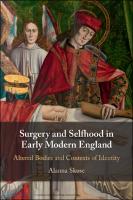Surgery and Selfhood in Early Modern England
Altered Bodies and Contexts of Identity
| dc.contributor.author | Skuse, Alanna | |
| dc.date.accessioned | 2022-06-07T13:57:18Z | |
| dc.date.available | 2022-06-07T13:57:18Z | |
| dc.date.issued | 2021 | |
| dc.identifier | OCN: 1195819997 | |
| dc.identifier.uri | https://library.oapen.org/handle/20.500.12657/56672 | |
| dc.description.abstract | Offering an innovative perspective on debates concerning embodiment in the early modern period, Alanna Skuse examines diverse kinds of surgical alteration, from mastectomy to castration, and amputation to facial reconstruction. Body-altering surgeries had profound socio-economic and philosophical consequences. They reached beyond the physical self, and prompted early modern authors to develop searching questions about the nature of body integrity and its relationship to the soul: was the body a part of one’s identity, or a mere ‘prison’ for the mind? How was the body connected to personal morality? What happened to the altered body after death? Drawing on a wide variety of texts including medical treatises, plays, poems, newspaper reports, and travel writings, this volume will argue that the answers to these questions were flexible, divergent, and often surprising, and helped to shape early modern thoughts on philosophy, literature, and the natural sciences. This title is also available as Open Access on Cambridge Core. | en_US |
| dc.language | English | en_US |
| dc.subject.other | Literature, Renaissance and Early Modern Literature, British History after 1450, History | en_US |
| dc.title | Surgery and Selfhood in Early Modern England | en_US |
| dc.title.alternative | Altered Bodies and Contexts of Identity | en_US |
| dc.type | book | |
| oapen.identifier.doi | 10.1017/9781108919395 | en_US |
| oapen.relation.isPublishedBy | 7607a2d0-47af-490f-9d2a-8c9340266f8a | en_US |
| oapen.relation.isFundedBy | d859fbd3-d884-4090-a0ec-baf821c9abfd | en_US |
| oapen.relation.isbn | 9781108843614 | en_US |
| oapen.collection | Wellcome | en_US |
| oapen.pages | 212 | en_US |
| oapen.grant.number | H5213000 |

